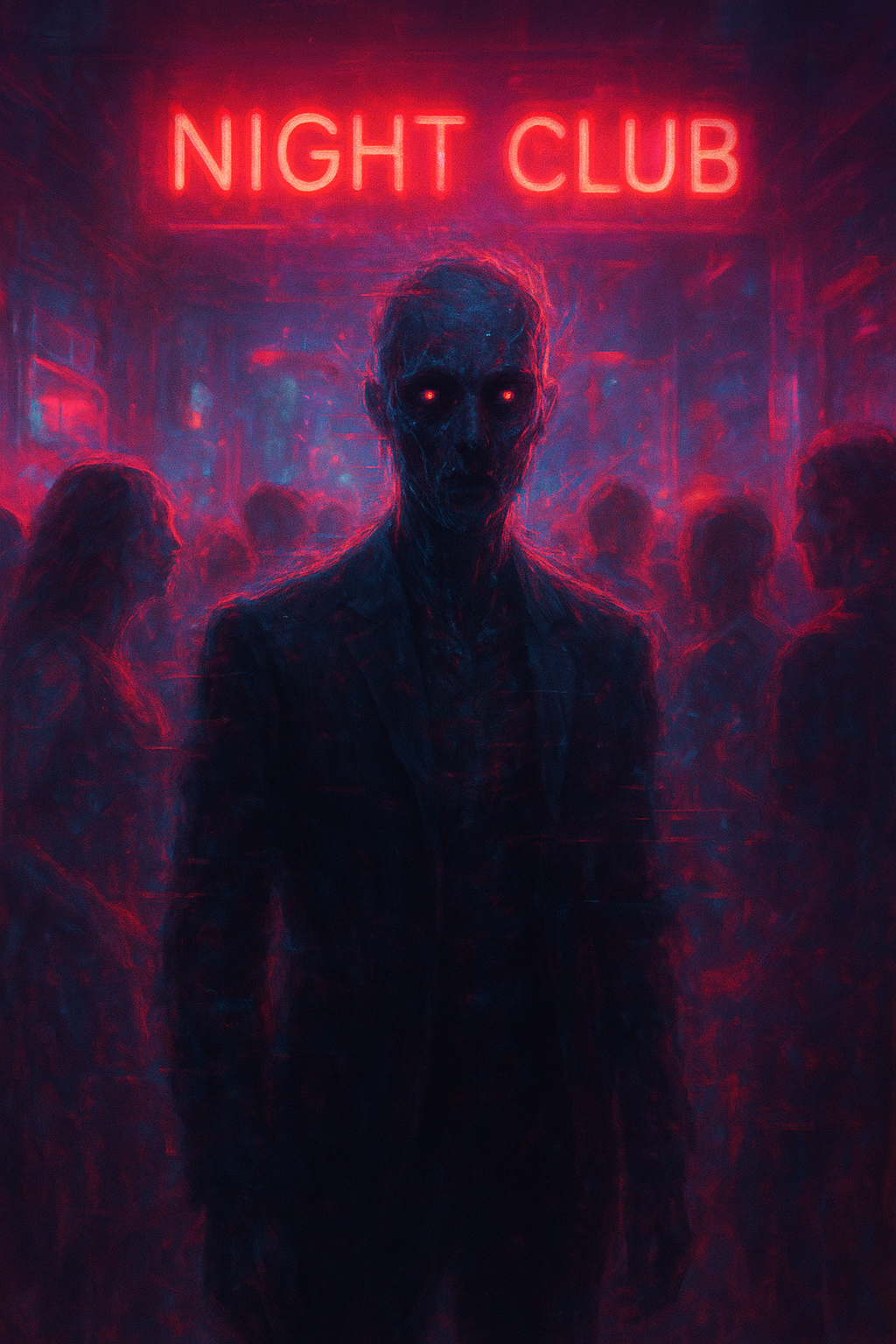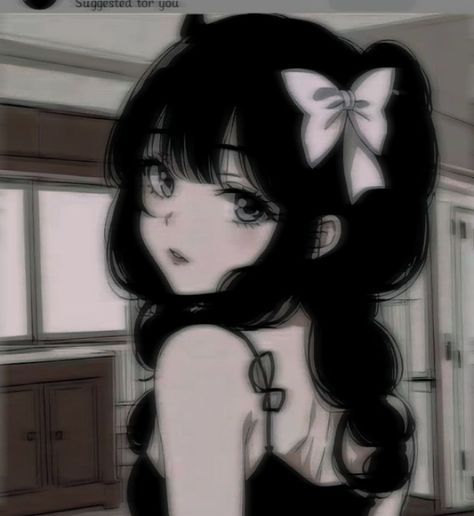Anna stepped out into the city, and the neon hit her like a blow. The wet streets shimmered, reflecting advertisements that flickered with the promise of perfection—pleasure, wealth, beauty, escape—but the glow only highlighted the filth that clung stubbornly to the asphalt. Garbage festered in gutters, slick with rain and oil, the smell of decay and human sweat rising in waves. The air carried the tang of burnt synth-meat, urine from narrow alleys, and a faint metallic note, the smell of iron from old blood or broken machinery.
She drew in a breath, sharp and tasting of ozone, and felt her limbs adjust to the weight of the world outside her apartment. The city pulsed with movement: bodies weaving through the streets, packed together in currents, faces glued to screens or darting nervously past one another. She felt herself thrumming with a cautious awareness, every muscle tense, every sense on edge. Touch now was a danger she could not afford. Every brush against another human could unravel her.
Instinctively, she moved with a predator’s careful grace, sliding between the crowd, skirts brushing against the damp of the street, elbows tucked close. Hands came perilously near her body, but she twisted, pivoted, shifted, refusing contact. She remembered, with sudden horror, the hunger that came from absorbing another’s life. She would not allow it. She had given up everything to become this, to inhabit herself in a way that was singular and indivisible. Becoming anything else—anything besides herself—was both repulsive and terrifying.
The city pressed in from all sides. Voices, laughter, the roar of engines, the scrape of boots on concrete, the squeal of doors—an overwhelming tide. Yet she moved with a wary grace, navigating the currents like a dancer avoiding a trap. Every corner threatened intrusion, every hand that brushed against hers or her shoulder a potential theft. Her chest tightened with vigilance; her mind, previously clear in the apartment, was now a taut wire, straining against the constant possibility of contamination.
And yet—inevitably—it happened. A figure pressed too close on a crowded platform, a brief, inadvertent contact: a graze of skin against her arm. Memory leapt through her like an electric current. She jerked back, clutching herself, as images invaded.
She was the mother, cradling a small, fevered child, rocking back and forth on a tattered chair. She could feel the child’s heat, the faint rattle of breath in a chest that should not have labored so hard. The mother’s panic, sharp and immediate, poured into Anna in a tidal wave of fear. Every fiber of her being became the small apartment, the smell of sickness, the whine of the wind through broken panes. And then the child’s cough, wet and raw, a sound she would never forget.
Anna fell against the wall, pressing her hands to her chest as if she could physically clutch herself back into shape. She tried to force the flood out, tried to push the mother’s fear back, tried to close the mind against it—but it was too late. She was no longer hollow. She was no longer free. She felt the weight of grief she had not earned, the responsibility of someone else’s life, and a nausea that twisted in her stomach as though she had swallowed the world itself.
She ran. Feet splashing through puddles, lungs burning, heart hammering. Every street corner brought more people, and each brought fragments of their own lives: the exhausted clerk counting coins at the diner, the drunk teenager hiding in a doorway from the city’s predators, the desperate man with a knife pressed against the inside of his coat, the ache of mothers, fathers, children, strangers alike. Each touch stole something from her, and she flinched, twisted, recoiled, but always the tide pressed against her. Her carefully constructed self—the singularity of Anna—began to fray.
The neon and grime, the suffocating press of humanity, drove her to the edge. She fled the streets, the alleys, the plazas, moving as if the very city itself were trying to strip her of the identity she had fought so fiercely to claim. She ran past flickering signs, past puddles reflecting faces that were not hers, past the smell of burnt plastic and blood. Her lungs burned, her legs trembled, and her mind teetered on the edge of collapse.
Finally, the concrete and steel receded. Trees, moss, and shadow replaced the city’s suffocating pulse. She stumbled into the forest, branches clawing at her hair and clothes, roots tangling beneath her feet, leaves soaking her in dew and darkness. For the first time in hours—or perhaps days—there were no strangers, no brush of skin, no theft of self. Here, in the quiet of the forest, the world’s memories could not reach her. She sank to her knees against a trunk, shivering, trembling, and let the solitude wash over her like a balm.
Ahead of her, a tree caught her attention. Hundreds of bells hung from its gnarled branches, some delicate and silver, others heavy, large and clangorous, each swaying gently in the faint wind. She rose slowly, drawn toward it. Fingers brushed the bark, and as her hand made contact, a subtle shift rippled through her. A pull, a current beneath the skin, and suddenly she found herself falling inward, tumbling into the tree as though it were hollow, a gateway to another place entirely.
She landed softly, though the ground beneath her felt impossibly alive. A root-tangled tunnel stretched before her, the soil dark and rich, lined with glowing mushrooms that pulsed faintly in shades of blue and violet. The air smelled of earth and decay, but also of something old, primordial, waiting. Ravens hunched in the corners, eyes gleaming in the dim light, their caws punctuating the silence as she moved past them. Their black feathers brushed against her skin as if testing her, and a faint shiver ran down her spine.
She wandered, the tunnel twisting unpredictably, roots knotting the walls like veins. Shadows moved at the edge of vision, and every step seemed to stretch time, elongating her awareness of space, of self. The mushrooms’ glow painted her in patches of ghostly light, revealing the curves and planes of her body she had only just begun to inhabit fully. Each inhalation drew the damp, earthy scent deeper into her lungs, embedding a sense of being simultaneously lost and found.
At last, the tunnel opened into a clearing. Moonlight—or something like moonlight—pierced through a dense canopy above, illuminating a creature waiting in the center. It was both beautiful and horrifying: its skin shimmered like liquid metal, reflecting every color in the canopy, while its form shifted subtly, impossible to fix in memory. Limbs stretched too long, fingers ending in delicate, claw-like tips, eyes unblinking and black as obsidian. Wings, thin and membrane-like, curled around it protectively, only to flex suddenly, revealing scales beneath that glimmered iridescently. Its mouth, wide and toothless, opened slightly, and a voice, not made of sound, but of sensation, reached out to her, beckoning.
Anna felt herself drawn forward, a pull deeper than instinct, deeper than fear—a sense of inevitability, as if she had always been moving toward this moment. She approached, trembling, heart racing, and extended her hands. The creature responded with a tilt of its head, a subtle quiver of its form, and she pressed herself against it.
The embrace was immediate, consuming. She felt herself melting into it, the boundaries of flesh and identity dissolving. Memories surged through her in a violent, beautiful flood: every fragment of life she had absorbed, every face she had worn, every touch, every stolen moment. They danced across her mind in a kaleidoscope of sensation, and she offered them all to the creature willingly.
Her own self—Anna, singular, fragile—slid away like water through fingers. The creature absorbed her, reshaped her, and in that instant she remembered: she had never been truly separate. She was the creature stepping into the world, exploring beyond the forest, tasting, touching, learning. All the faces, all the stolen lives, all the moments of wonder and horror—they were hers no longer to own, only to give, as the creature welcomed her fully.
She became one with it. Her mind dissolved into a lattice of consciousness that stretched through sinew and scale, through memory and experience. The forest, the bells, the tunnel, the mushrooms, the ravens—they were all transformed in her perception into extensions of its presence. And as the last fragment of Anna’s self gave way, she understood, in a way that was not thought but being, that she had only ever existed as this: a vessel, a traveler, a collector, a part of something larger and infinitely more alive.
The creature and Anna—now inseparable—shifted in unison, a pulse of life that moved outward into the forest, toward the city beyond, toward every street, every neon-lit corner, every crowd. She would walk among them again, feel them, taste them, learn, and yet this time there would be no fear of losing herself. For she was not herself, not another, not hollow. She was the creature incarnate, stepping into the world to explore, to consume, to understand, to become.







A mesmerizing, immersive journey that fuses vivid cyberpunk streets with a haunting exploration of identity and transformation.
Thank you! :D